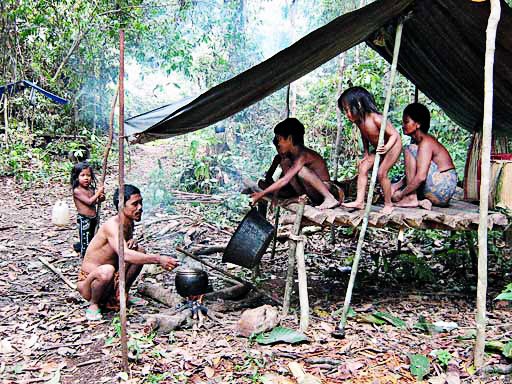Popular Reads
Top Results
Can't find what you're looking for?
View all search resultsPopular Reads
Top Results
Can't find what you're looking for?
View all search resultsLegal uncertainty 'at root cause' of mistreatment of indigenous people
Change text size
Gift Premium Articles
to Anyone
A
civil society organization has said Indonesia’s indigenous people have no legal certainty and accused the government of recognizing their existence only on two occasions, namely during elections and at time of conflict.
The Indigenous People’s Alliance of the Archipelago (AMAN) said indigenous people in the country often suffered discrimination and human rights violations by the government, especially regarding land disputes.
“The existence of indigenous people in Indonesia is stipulated in several laws, including the 2003 Forestry Law, the 1960 Agrarian Law and the 2014 Village Law,” AMAN secretary-general Abdon Nababan said in a discussion in Jakarta on Thursday.
However, this acknowledgment is apparently not sufficient to earn state recognition, the activitist said.
Community and Ecological-based Society for Legal Reform (HuMA) data record 232 natural resource and agrarian conflicts in areas across Indonesia during the 2006-2012 period, affecting 91,968 people from 315 indigenous communities.
In an investigation to find the root cause of the situation, the National Commission on Human Rights (Komnas HAM) found that poor recognition of the existence of indigenous people in the country rendered their legal status uncertain. The government’s tendency to issue policies beneficial only to large-scale companies has aggravated the situation, according to Komnas HAM.
“Women have often been discriminated against. It often happens that women are not involved in solution-finding processes,” Komnas HAM commissioner Sandra Moniaga said during the discussion.
“There is no body with the special authority to solve agrarian conflicts,” she added.
To end discrimination and violence against indigenous people, AMAN is once more calling on the government to immediately pass the recognition and protection of the rights of indigenous people bill into law.
The bill contains a number of key elements, such as the definition of indigenous communities, their rights, the procedures used to settle customary land disputes and the establishment of a task force to handle indigenous matters at the central and regional levels.
The House of Representatives has not listed the bill on the priority list for the 2016 National Legislation Program, despite the bill having been proposed by the Indonesian Democratic Party of Struggle (PDI-P) faction in 2012. (vps/ebf)










